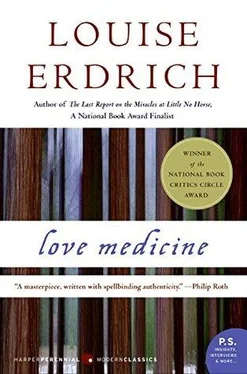Louise Erdrich - Love Medicine
Здесь есть возможность читать онлайн «Louise Erdrich - Love Medicine» весь текст электронной книги совершенно бесплатно (целиком полную версию без сокращений). В некоторых случаях можно слушать аудио, скачать через торрент в формате fb2 и присутствует краткое содержание. Год выпуска: 2005, Издательство: Harper Perennial Modern Classics, Жанр: Современная проза, на английском языке. Описание произведения, (предисловие) а так же отзывы посетителей доступны на портале библиотеки ЛибКат.
- Название:Love Medicine
- Автор:
- Издательство:Harper Perennial Modern Classics
- Жанр:
- Год:2005
- ISBN:нет данных
- Рейтинг книги:3 / 5. Голосов: 1
-
Избранное:Добавить в избранное
- Отзывы:
-
Ваша оценка:
- 60
- 1
- 2
- 3
- 4
- 5
Love Medicine: краткое содержание, описание и аннотация
Предлагаем к чтению аннотацию, описание, краткое содержание или предисловие (зависит от того, что написал сам автор книги «Love Medicine»). Если вы не нашли необходимую информацию о книге — напишите в комментариях, мы постараемся отыскать её.
Love Medicine — читать онлайн бесплатно полную книгу (весь текст) целиком
Ниже представлен текст книги, разбитый по страницам. Система сохранения места последней прочитанной страницы, позволяет с удобством читать онлайн бесплатно книгу «Love Medicine», без необходимости каждый раз заново искать на чём Вы остановились. Поставьте закладку, и сможете в любой момент перейти на страницу, на которой закончили чтение.
Интервал:
Закладка:
Then I set June down in front of me and closely watched her.
Brave as me, that was June. The soap flakes surely gagged her.
But she spat them carefully into the dishcloth I put in her hands.
She wouldn’t look at me.
“Look at me,” I said.
I turned her head toward me and looked in her sorrowful black eyes. I looked a long time, as if I was falling down a hill. She blinked gravely and returned my stare. There was a sadness I couldn’t touch there. It was a hurt place, it was deep, it was with her all the time like a broke rib that stabbed when she breathed. I took her hand.
“June Morrissey,” I said, “your mama was my sister.”
She looked at me, still not speaking.
“Your mama died,” I said.
There was a flicker of a lash.
“You can be my girl and live here.”
She spoke to me, finally, with no expression. “I don’t care.”
Maybe she cared and maybe she did not. She stayed shut.
Nector had no time for any of them then, not him with his slim wages and his chips at the pool hall and home-brewed wine. If I wasn’t feeding children I was chasing Nector down. I knew all the back rooms.
I’d take money from his hand that was lighting on the bar. I’d leave him nothing. He’d have to come home and beg when he needed more. So I didn’t have much time for any one of the children about then, and I was glad, that summer, when Eli came around.
Spring and summer, when the furs were thin, we’d see more of Eli around home. He lived in a mud-chink bachelor shack on the other end of the land. He was a nothing-and-nowhere person, not a husband match for any woman, but I had to like him. Eli drank but he never lost his head. He rarely spoke. Sometimes we sat in a room all evening, hardly talking, although he spoke easy with the children. I’d overhear. He had a soft hushed voice, like he was stalking something very near. He showed them how to carve, how to listen for the proper birdcall, how to whistle on their own fingers like a flute. He taught June.
Or she taught him. They went into the woods with their snares and never came home empty-handed. They went to the sloughs to shoot mud hens and brought home a bag of the tiny, black, greasy birds. Nector was rarely home then. He worked late or sneaked to gamble. We’d roast the birds and make a high pile of their twig bones in the middle of the table. Eli would sing his songs. Wild unholy songs. Cree songs that made you lonely.
Hunting songs used to attract deer or women. He wasn’t shy when he sang them. I had to keep to my mending.
I was seeing how the girl spoke more often once he started coming. She’d picked an old scrap of billed hat from a dump and wore it just like him, soft and squashed in on her hair. I began to understand what she was doing as time went on. It was a mother she couldn’t trust after what had happened in the woods. But Eli was different. He could chew pine sap too.
The old hens were starting to cackle.
Seven senses. Seven senses for scandal was what they had in those days.
They came around to my door — just to pass the time away. I let them in for brewed coffee. They were the ones I knew the smell of, who made novenas and holy days and nosed up to the priests. They were eager to sniff what was happening in my house.
“Where’s Nector?” Old Lady Blue, innocent as day, wonders.
She thinks she saw him passed out around back of the agency pump house.
But certainly that could not be him!
“Does Eli, your brother-in-law, live here now instead?” Sly and shriveled old bean pod!
“How about that girl,” says old, fat La Rue “Do you trust him alone with her all the time like that? I see them coming out of the woods, down the road. What do they got in their bag?”
I just laugh, don’t let them get a wedge in. Then I turn the table on them, because they don’t know how many goods I have collected in town.
“How’s your son? Too bad he crossed the border. I heard he had to go.
Are you taking in his newborn?”
“I tell you for your own good. Your man goes to Lamartine’s house with a bagged bottle, Mrs. Blue.”
“How’s your heart? It’s a shame your daughter left you.”
I didn’t like to be the one to remind these old cows of their own bad lives. But I had to protect my plans. There was just a temporary hitch in them-Nector having a last fling.
One night and then another night he didn’t come home. The second night Eli sang late until the children hung asleep in their d chairs. They had to be carried off and fit together on the rollaway, neat puzzles of arms and legs. When they were all arranged we went back in the kitchen.
This was usually the time Eli walked back to his place.
But instead of taking leave, he sat down at the table again and rolled a stub of tobacco from his pouch.
It was nothing. I sewed a long rip. A longer seam. It was nothing.
But I felt his eyes resting upon me and I couldn’t took up at him.
The cloth turned in my hands. The lamp burned. I thought of lake-shore pebbles, naked as eyes and smooth, and I thought of his lean hands, and I did not dare move. Something dark and wavering, fringed like a flower’s mouth, was collecting in the room between us. I felt him standing up. I felt the rustle of his soft, stained clothes. He stepped once. The board creaked. I went helpless at the sound, and my hands locked.
“Marie?” he asked, very quiet.
I did not look up.
When I didn’t answer, he stepped to the door quickly, all of a sudden, and walked out.
My head snapped up. I looked directly into the face of June.
Soundless as air she had unwound herself from all the others and stood in the doorway, waiting and watching for what she felt in the air. She didn’t know what she felt. I put the needle down.
“Come here,” I said.
She came, walking as in a dream, and I held her in my lap for the first and only time. I held her and I stroked her hair and hummed in her ear.
She pretended to sleep, breathing evenly and pure. I stroked the beads around her neck. Then sleep took her for real. The strain went out of her. The breath came deep.
She sagged like an empty sack. I held her until my legs went numb under her weight, until the lamp wick smoked, until the’ board creaked again and it was Nmtor, come home.
I had fallen asleep in the chair. I don’t-know how long he’d stood there, staring at me with the child in my arms. I saw that he become had gone through the wringer. He was red-eyed, gaunt, and he was drunk.
When I opened my eyes he began to reach into his pockets with both hands.
He pulled out bills, coins, and crumpled dollars. He laid them in the mending. He took the money from his hatband. He emptied his shoes. He had a small roll in his sock. He had a bill clipped to his belt.
“C’mere now,” he said. The money was a rumpled, winking pile. I never moved. He bent over and took June from my arms.
He laid her in the small space of bed where she belonged, and then he came back to the kitchen for me.
I didn’t ask him where he got all that money.
I went down beneath his hands and lay quiet. I rolled with his current like a stone in the lake. He fell on me like a wave. But like a wave he washed away, leaving no sign he’d been there. I was smooth as before. I slept hard, and when I woke he was gone.
All day with the children, I felt a low grief I couldn’t name yet.
Something inside me had shrunk and hardened in the deep. One thing more. He had not left behind even a trace of coin. When I went out to the kitchen, I saw that the table was bare. He might not have even come home. It so discouraged me I could not go out this time and drag him back. I was so deeply sunk that I was not surprised when the girl came to me, anxious and still. I was not surprised that she would speak to me.
Читать дальшеИнтервал:
Закладка:
Похожие книги на «Love Medicine»
Представляем Вашему вниманию похожие книги на «Love Medicine» списком для выбора. Мы отобрали схожую по названию и смыслу литературу в надежде предоставить читателям больше вариантов отыскать новые, интересные, ещё непрочитанные произведения.
Обсуждение, отзывы о книге «Love Medicine» и просто собственные мнения читателей. Оставьте ваши комментарии, напишите, что Вы думаете о произведении, его смысле или главных героях. Укажите что конкретно понравилось, а что нет, и почему Вы так считаете.












